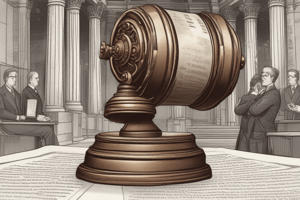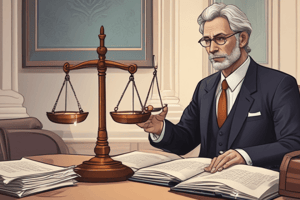Podcast
Questions and Answers
What is the primary justification for an AAL accepting fees from clients?
What is the primary justification for an AAL accepting fees from clients?
- To misappropriate a client's money
- To engage in a charitable activity
- To charge excessive fees for personal gain
- To provide adequate compensation to serve clients effectively (correct)
What is the consequence of an attorney charging excessive fees?
What is the consequence of an attorney charging excessive fees?
- A waiver of fees
- An increase in fees
- A reduction in fees
- A ground for disciplinary action (correct)
Under what circumstances can an attorney reduce or waive fees?
Under what circumstances can an attorney reduce or waive fees?
- If the client would be effectively deprived of legal advice or representation (correct)
- If the client is wealthy
- If the client refuses to pay
- If the attorney is not interested in the case
What is the principle governing the disclosure of confidential information by an AAL?
What is the principle governing the disclosure of confidential information by an AAL?
What is the exception to the rule that an AAL cannot refuse to act on behalf of a party?
What is the exception to the rule that an AAL cannot refuse to act on behalf of a party?
What is the purpose of the Cab Rank Rule?
What is the purpose of the Cab Rank Rule?
What is the significance of the Rondel v Worsley case?
What is the significance of the Rondel v Worsley case?
What is the primary purpose of an AAL's professional fee?
What is the primary purpose of an AAL's professional fee?
When is an attorney not obliged to accept work?
When is an attorney not obliged to accept work?
What is the significance of the skirt and blouse rules in the context of an AAL?
What is the significance of the skirt and blouse rules in the context of an AAL?
Flashcards
Duties of a Lawyer
Duties of a Lawyer
A lawyer has duties to the court, client, and colleagues.
Professional Ethics
Professional Ethics
A set of standards guiding professional conduct for lawyers.
Supreme Court Rules
Supreme Court Rules
Legal framework governing court procedures set in 1978/1988.
Rule 70 (Legal Admission)
Rule 70 (Legal Admission)
Signup and view all the flashcards
Attire for Male Attorneys
Attire for Male Attorneys
Signup and view all the flashcards
Attire for Female Attorneys
Attire for Female Attorneys
Signup and view all the flashcards
The Cab Rank Rule
The Cab Rank Rule
Signup and view all the flashcards
Exceptions to Cab Rank Rule
Exceptions to Cab Rank Rule
Signup and view all the flashcards
Breach of Code of Ethics
Breach of Code of Ethics
Signup and view all the flashcards
Fees and Remuneration
Fees and Remuneration
Signup and view all the flashcards
Study Notes
General Duties of a Lawyer
- A lawyer has duties to the court, client, and other brethren of the profession
- Ethics are the preferable standard of conduct/behavior relating to human activity
- Professional ethics is a set of standards relating to the activities/conduct of professionals
Applicable Laws/Case Laws
- Supreme Court Rules – 1978 / 1988
- Judicature Act - 1978
- The Constitution - 1978
- Case Laws: Chandrathilake v Munasinghe, Re Wilbert Fernando, Re Dematagoda Don Harry Wilbert, Re Brito
Rule 70 of the Supreme Court Rules of 1978
- No person who has not been duly admitted and enrolled as an Attorney-at-Law can assist and advise clients, appear, plead, or act for or on behalf of clients in any court or other institution established by law for the administration of justice
Attire of Attorneys-at-Law
- Rule 6: attire for male Attorneys-at-Law - black coat and dark or white trousers and black tie, or white national costume, or black Shervani with dark or white trousers
- Rule 7: attire for female Attorneys-at-Law - saree and jacket in white, black, off-white, grey, or mauve, or black trousers with white blouse and black coat and shoes, or black skirt with white blouse and black coat and shoes
Consequences of a Breach of Code of Ethics
- The Disciplinary Committee will procure/receive evidence and examine witnesses and present their findings to the Supreme Court
- Charges are proved, the SC shall take suitable action
The Procedure - Judicature Act - S 42
- Disciplinary inquiry
- Disciplinary Committee
The Cab Rank Rule
- Rule 5: an Attorney-at-Law may not refuse to act on behalf of a party/person in any matter/proceeding before any court, tribunal or other institution established for the administration of justice or in any professional matter at their professional fee
Exceptions
- Where there is a personal interest
- Conflict of interest between two of your clients
- Matter means that the lawyer would be getting involved in the commission of an offence
- Where the case affects the lawyer's professional independence
- Matters involving the lawyer as a witness
Fees and Remuneration - Rule 27-29
- Justification for accepting fees: an Attorney-at-Law is not engaged in a charitable activity and not obliged to accept work unless the client can pay, rendering services for a living and charging fees is a characteristic of a professional, and adequate compensation is necessary to serve clients effectively and preserve the integrity and independence of the profession
- Charging excessive fees is a ground for disciplinary action
- Attorney can reduce or waive the fees on account of poverty/hardship or where the client would be effectively deprived of legal advice or representation
- Attorney shall not misappropriate a client's money
- A Retainer
Studying That Suits You
Use AI to generate personalized quizzes and flashcards to suit your learning preferences.





